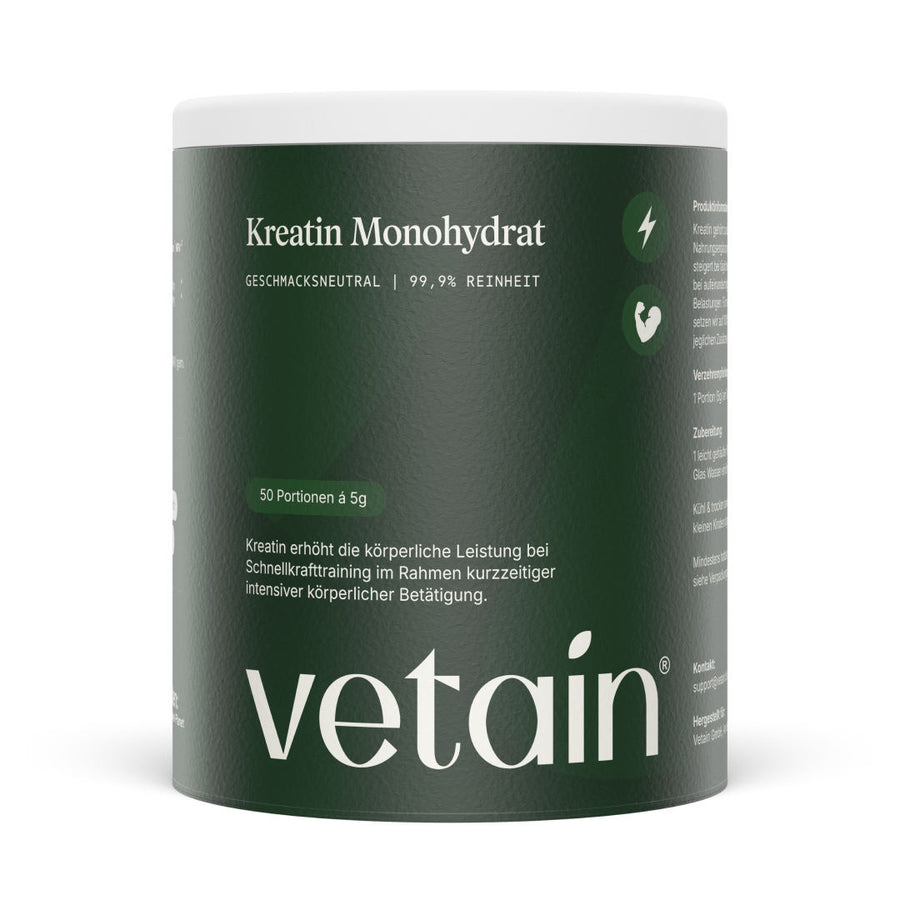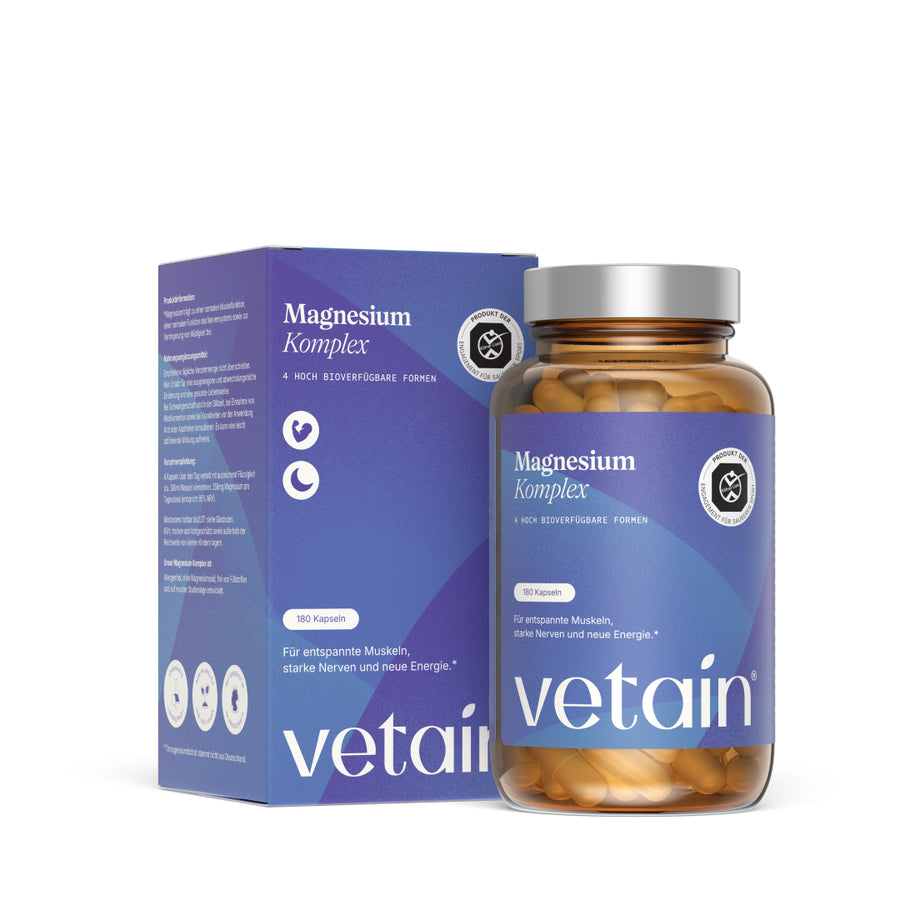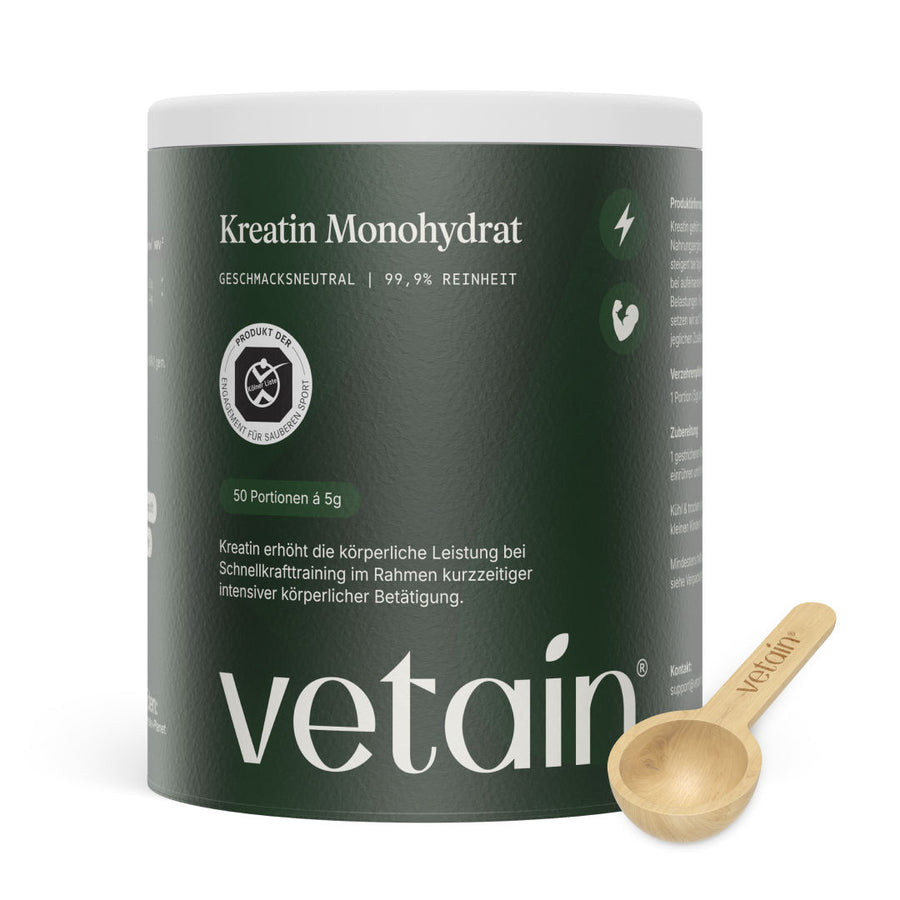Miracle cure or just hocus-pocus? If you haven’t taken a closer look at creatine and its effects yet, you might be asking yourself this question. After all, not every fitness trend is worth following. Quite the opposite: with some trends you’ve already seen, we definitely advise against them. But what about the effects of creatine? Fact or myth? We at Vetain have done the work for you and put together all the information you need on this topic here. Enjoy reading!
Why is everyone talking about the effects of creatine?
Creatine is an organic acid that your body produces itself, mainly in the liver, kidneys, and pancreas. Learn more in our article "What is Creatine?"
Creatine’s main job? The most well-known effect of creatine is connected to your muscles. It supports the rapid supply of energy by being stored in your muscles as creatine phosphate. So, when you push yourself to the limit during training, creatine kicks in to refill your energy reserves. That’s why it’s such an interesting supplement, especially for short, intense efforts like weightlifting or sprints.
No wonder that creatine – and especially Creatine Monohydrate, as you can find in our shop – is considered one of the most popular supplements. It’s also scientifically better researched than most other supplements. In comparison: there are far fewer studies and reliable effects proven for BCAAs, fat burners, and detox products – and yet they are taken more often than creatine.
Did you know? Your body produces about 1–2 grams of creatine per day, mainly in the liver, kidneys, and pancreas.
What are the differences between the various forms of creatine?
Creatine Monohydrate is the classic: effective, well-researched, and affordable. Creatine HCL scores with better solubility and fewer side effects such as bloating (which, by the way, can also be easily avoided with creatine monohydrate). Creatine Ethyl Ester promises faster absorption but shows fewer real benefits. Creatine Magnesium Chelate combines creatine with magnesium – unnecessary if you’re already taking a magnesium complex like our Vitamin Bundle.
%-product_content-%
How exactly does creatine work in the body?
To help you understand how outstanding the effects of creatine really are, let’s take a closer look at its different modes of action – and where in the body they occur. Even when a substance is very well researched, you should always know exactly what it does before testing it yourself. By the way, the following effects attributed to creatine are not just personal anecdotes, but scientifically proven facts.
The effects of creatine in training
Creatine contributes – and this is the main reason most people take it – to increased physical performance during high-intensity, short-term exercise (starting at 3 g/day). Put simply, it boosts the production of ATP (adenosine triphosphate), the primary energy source for intense activity like strength training. With more ATP, you can train harder and longer, which directly promotes muscle growth. Studies have also shown that creatine can cause water retention in muscles, which may affect weight but also makes muscles look fuller. No wonder it’s so popular among athletes, right?
Does creatine affect the brain and mental health?
Studies are currently exploring the connections – until we have reliable results, we can’t say much yet. But we’ll keep you updated!
Many hope creatine helps with weight loss
Creatine itself doesn’t burn fat, but: more strength and endurance allow for more intense workouts, which in turn increase calorie expenditure. Even though we’re not fans of strict diets – as they’re now often considered negative and “unhealthy” – we have nothing against a lean look. From now on though, only with creatine!
How fast does creatine work and how long do the effects last?
Depending on your training goals, you can start with a loading phase. This means taking about 20 grams daily, spread over several doses, for the first five to seven days to quickly fill your muscle creatine stores. First effects can be felt after just a few days. Alternatively, if you take the daily maintenance dose of 3–5 grams, it takes about two to three weeks until the stores are optimally filled and the effects fully kick in.
And how long do the effects last after you stop taking creatine? The stored reserves are slowly depleted within four to six weeks, and the body returns to its normal creatine level. That means you won’t suddenly lose your strength or muscles overnight, but the extra performance boost gradually disappears. The good news is that the additional muscles you built with creatine won’t vanish as long as you keep training!
Loading phase or not: in the long run, the difference is only marginal. The main advantage of a loading phase is filling your stores more quickly.
Did you know? Creatine is one of the best-researched supplements in the world. Studies date back to the 1990s.
Side effects of creatine: what you should know
Creatine has the reputation of being a safe and well-tolerated supplement – and rightly so. Still, there are a few points to keep in mind. For example, there are rumors that creatine might harm the liver or heart. However, scientific studies show that in healthy individuals, no negative effects on the liver or heart are expected – even with long-term use. What’s important is sticking to the recommended dose of 3–5 grams daily and not overdosing continuously. People with existing kidney or liver conditions should consult a doctor before taking creatine.
Some people may experience side effects such as stomach issues. Sometimes, taking creatine can cause bloating and diarrhea. These occur mainly when too much is taken or too little water is consumed. This is because creatine draws water into the muscles; thus, your water requirements increase.
Creatine for everyone: women, men, and specific groups
Of course, you can’t talk about the effects of creatine without asking: does it work the same for everyone? The short answer is: yes. Creatine works the same for everyone.
And many women love creatine. Why? One of the main reasons lies in natural hormone balance: women naturally have less testosterone, which plays a key role in muscle growth and strength in men. Creatine can help balance this by boosting energy production in the muscles. But don’t worry: this doesn’t mean creatine increases testosterone levels – neither in women nor in men!
By the way, the myth that creatine creates “bulky muscles” is nonsense!
Groups who should definitely consult a doctor before taking creatine include:
People with kidney problems (e.g., kidney insufficiency)
People with liver diseases
Pregnant and breastfeeding women
Teenagers and children (due to developing metabolism)
People with cardiovascular diseases
People with gastrointestinal issues (e.g., IBS)
People with autoimmune diseases (e.g., lupus, multiple sclerosis)
People taking medications (e.g., diuretics or blood pressure meds)
Older adults (individual effects may vary)
People with rare metabolic disorders (e.g., creatine transporter deficiency)
Got it?
Creatine powder vs. other forms
Creatine powder is the most popular and affordable form. It’s easy to dose and mix into drinks. Other variants like creatine HCL or capsules promise advantages like better solubility but are usually more expensive. Especially if creatine sometimes causes you stomach issues, capsules could be a good option. They have one advantage powder doesn’t: they dissolve in the intestine instead of the stomach, which often prevents digestive discomfort.
Did you know? Creatine is also found in food! Meat and fish are particularly rich in it – which is why vegetarians and vegans often benefit most from supplementation.
Taking creatine correctly: summary of tips and tricks
The question of whether creatine should be taken before or after training comes up again and again. Studies show that timing is less important – what matters most is taking it regularly. Many prefer it after training, as muscles are particularly receptive then. Others love it as a “booster” – but just to be clear, it doesn’t actually act like a pre-workout booster.
The ideal daily dosage is 3–5 grams, at least 3.5 g, regardless of gender or training level.
A loading phase with higher doses can fill up stores more quickly, but it isn’t necessary.
Important: Drink plenty of water! Creatine draws water into the cells, and proper hydration helps prevent side effects like dehydration or stomach issues.
In combination with other supplements like protein powder or carbohydrates, creatine can be particularly effective.
Carbohydrates increase insulin release, which helps creatine absorption in muscles.
A smart routine that includes creatine makes the difference – that’s how you get the most out of your training!
Creatine powder can be mixed into anything from smoothies to pudding, oatmeal, or pancakes in all our recipes.
Check out our best tips for taking it in our article: When to take Creatine?
%-split_content-%
Myth vs. Truth: FAQs
My creatine is expired: still usable or better to throw away?
Expired creatine isn’t automatically useless. As long as it was stored dry and cool, it often remains stable beyond the best-before date. However, the effectiveness of creatine can decrease if exposed to moisture, as it turns into creatinine – a less effective substance. Noticeable clumps or a strange smell? Better discard it! Otherwise, its effects shouldn’t be reduced even if it’s past the expiration date.
Creatine Monohydrate or alternatives: which is better?
Creatine Monohydrate remains number one: affordable, effective, and well-studied. Creatine HCL, Kre-Alkalyn, or Ethyl Ester may be more soluble or easier on sensitive stomachs, but they usually don’t offer significant advantages. For most people, monohydrate is the best choice – as long as you pay attention to quality.
Does creatine make you fat?
No, creatine doesn’t make you fat – at least not in terms of body fat gain. It can, however, lead to short-term weight gain since it pulls water into the muscle cells. That makes muscles look fuller and boosts performance. Fat stores remain unaffected as long as you maintain a balanced diet.
I’m taking creatine but don’t notice any effects. Why?
Not everyone responds equally to creatine. “Non-responders” often already have high natural creatine stores in their muscles, so additional intake barely shows an effect. The solution: take creatine with carbohydrates, as this can improve absorption. And of course, consistent training is crucial to fully benefit from it.















 8 Min
8 Min
 Zuletzt aktualisiert am 17.11.2025
Zuletzt aktualisiert am 17.11.2025




